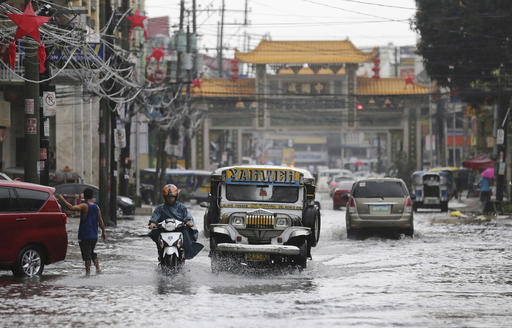Typhoon Nina threatens Metro Manila
A powerful typhoon threatened to bring heavy rains and winds to the heavily-populated Philippine capital as it dragged its way across the archipelago on Monday, spoiling the Christmas holidays.
Typhoon “Nina” (international name: Nock-Ten), which made landfall on the eastern island province of Catanduanes on Sunday, Christmas Day, is forecast to move westward towards the country’s heartland, packing winds of 230 kilometers (143 miles) per hour, the government weather station said.
More than 218,000 people have already fled their homes while 48 domestic and international flights were cancelled, the civil defense office said, as the unusually late typhoon marred Christmas celebrations in the largely Christian nation.
So far there have been no reports of casualties after the government took measures to prepare communities even before the storm hit.
Nina, which is moving northwest at 20 kilometers per hour, is expected to affect Manila and the surrounding area later in the day before exiting the main island of Luzon on Monday afternoon, the government weather station said.
Article continues after this advertisementThe bustling metropolis of about 13 million was eerily quiet the day after Christmas with the usual holiday revelers staying indoors as Nina approached.
Article continues after this advertisementThe civil defense office said the capital could suffer “heavy to intense rains, flashfloods and severe winds,” with rescue boats ready to be deployed in case rivers overflow.

A passenger jeep navigates a flooded street caused by rains from Typhoon Nina (Nock-Ten) in Quezon City on Monday, Dec. 26, 2016. The powerful typhoon slammed into the eastern Philippines on Christmas Day, spoiling the biggest holiday in Asia’s largest Catholic nation, where a governor offered roast pig to entice villagers to abandon family celebrations for emergency shelters. (AP Photo/Aaron Favila)
READ: Metro Manila on typhoon’s path
“Our local disaster councils are on red alert. We have pre-positioned relief supplies and rescue and (road) clearing equipment in Metro Manila,” said Mina Marasigan, spokeswoman of the country’s disaster monitoring council.
The coastguard on Sunday ordered the beaches south of Manila to be cleared of holidaymakers by Monday, while residents of the capital’s seaside slums were warned to leave their homes.
The storm previously cut off electricity to millions and forced government agencies to order evacuations of whole communities in the eastern region of Bicol which felt the brunt of the storm on Christmas day.
“They intentionally cut off electricity (in Bicol) because of the strong winds so no one would be accidentally electrocuted if the power lines are knocked down,” Marasigan told Agence France-Presse.
Wet Christmas
“Government workers in the Bicol region, particularly those involved in disaster relief and operations, are working round-the-clock even on Christmas Day as typhoon Nina (the local name of Nina) maintains its strength and continues to pose a serious threat to Bicol region,” President Rodrigo Duterte’s spokesman Martin Andanar said in a statement.
Marasigan said hundreds of people in Bicol celebrated Christmas day in evacuation centers where many had to make do with emergency food packs.
READ: Typhoon Nina evacuees in Bicol rise to 300,000
Some local officials had offered roast pigs — the traditional Filipino holiday fare — to entice constituents to go to evacuation centers, Marasigan said.
Some 20 typhoons or lesser storms strike the Philippines each year, routinely killing hundreds of people, and Bicol is often the first region to be hit.
It prides itself on having sharpened its disaster response to minimize casualties.
Mammoth tsunami-like waves devastated the city of Tacloban and nearby areas when Supertyphoon Yolanda (international name: Haiyan) struck the central Philippines in November 2013, leaving 7,350 people dead or missing./rga